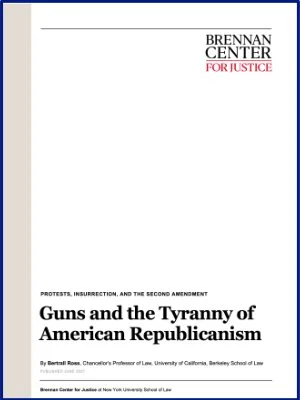By Bertrall Ross
On January 6, 2021, men and women, some of them armed, stormed the U.S. Capitol to try to undo a fair and legitimate presidential election. For the insurrectionists, the election results meant something more than one candidate winning and another one losing. It represented a tyrannical threat to their racialized conception of American republicanism, one that President Donald Trump promoted and sought to legitimate. For those Americans, guns reemerged as an instrument of self-defense against tyranny, just as guns have throughout U.S. history. Yet those individuals’ actions — ones that they understood as resisting tyranny — in fact threatened to destabilize American democracy through violence.
The racialized conception of American republicanism has historically served as psychological ballast for many poor and working-class Americans, including many of those involved in the insurrection. Underlying that conception is an extreme economic inequality that has left many of the insurrectionists marginalized and alienated — and that itself represents the real tyranny that threatens all poor and working-class people’s ability to participate fully in democratic processes.
This essay explores the economic inequality that lies at the foundational core of American republicanism. It then argues that violent threats to the stability and sustainability of the American republic will persist until we confront economic inequality. Otherwise, extreme economic inequality will lead to a future in which the marginalized increasingly resort to guns and violence, and the government is forced to turn to repression to ensure the republic’s survival.
New York: Brennan Center for Justice at New York University School of Law, 2021. 8p.


